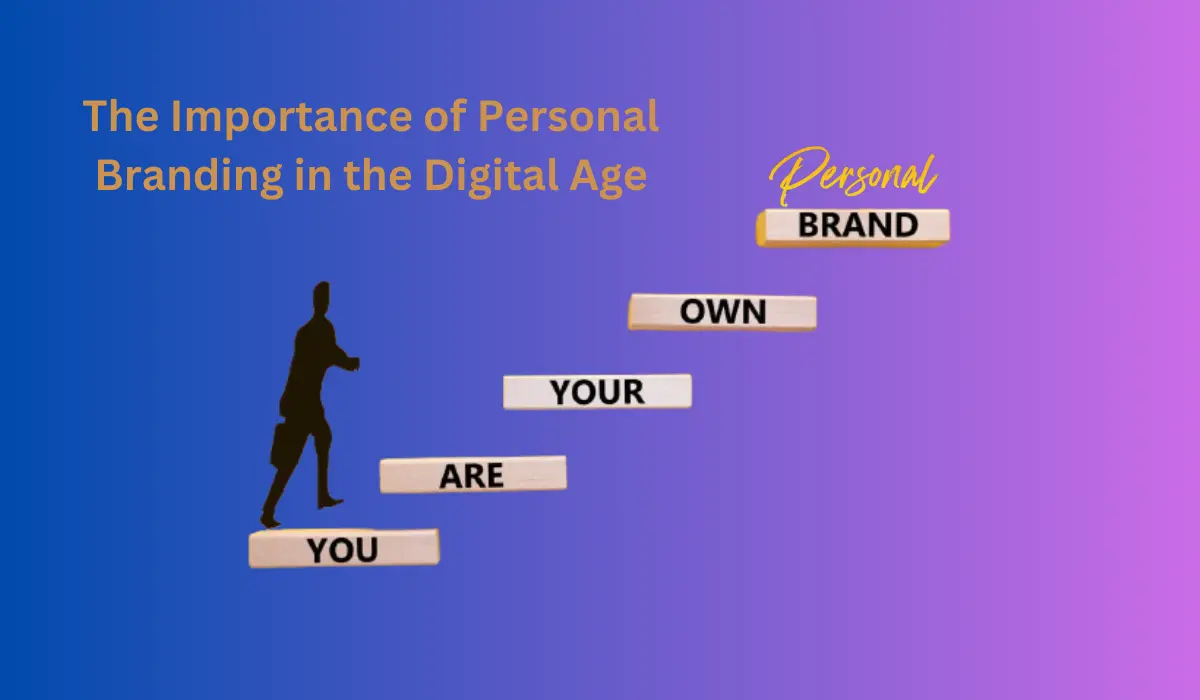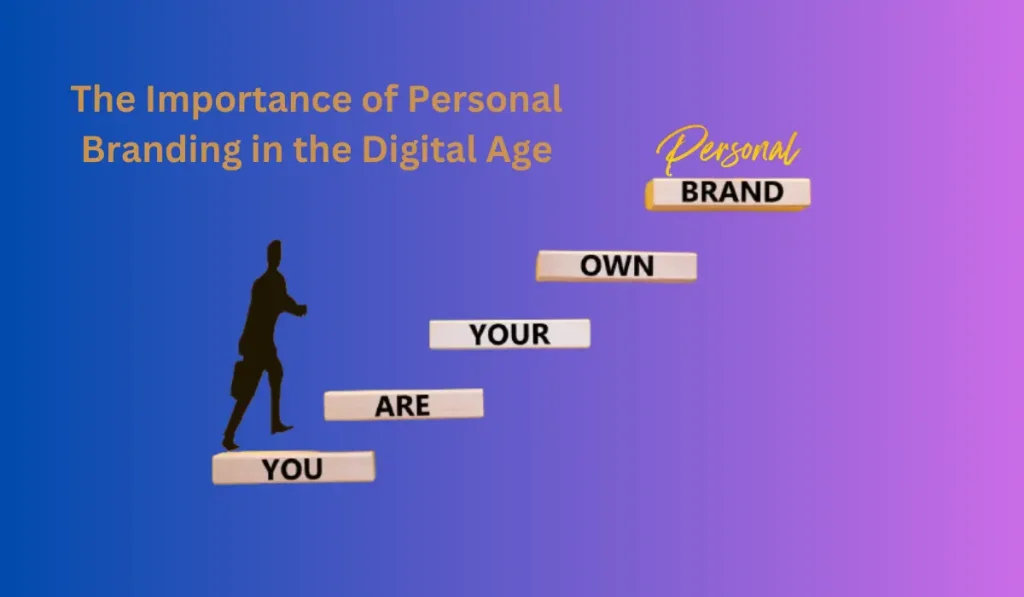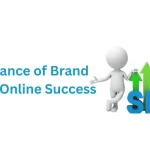In today’s hyper-connected world, where digital platforms dominate how we interact, communicate, and do business, personal branding has emerged as a fundamental tool for success. The concept of personal branding, once reserved for celebrities and high-profile individuals, has now become essential for professionals across all industries. In this digital age, where information is readily available and first impressions are often formed online, cultivating a strong personal brand is more critical than ever before. In this context, we talked about the importance of personal branding in the digital age.
Defining Personal Branding
Personal branding refers to the process of strategically managing and promoting oneself to create a distinct and memorable impression in the minds of others. It involves identifying and communicating your unique value proposition, expertise, and personality to your target audience. In essence, your brand is what sets you apart from others and shapes how you are perceived both online and offline.
The Digital Landscape
The advent of the internet and social media has revolutionized the way we build and showcase our brands. Platforms like LinkedIn, Twitter, Instagram, and personal websites offer unprecedented opportunities to connect with a global audience, share our expertise, and establish our credibility. However, this digital landscape also presents challenges, as the abundance of online content can make it difficult to stand out amidst the noise.
Why Personal Branding Matters
Personal branding matters because it empowers individuals to take control of their professional reputation, build meaningful connections, and create opportunities for success in an increasingly competitive and dynamic world.
Differentiation:
In today’s competitive landscape, personal branding helps individuals stand out from the crowd. You distinguish yourself from others in your field or industry by highlighting your unique skills, experiences, and personality traits.
Credibility and Trust:
A strong personal brand builds credibility and trust with your audience. Consistently delivering valuable content, demonstrating expertise, and engaging authentically with your followers fosters trust and enhances your reputation as a reliable authority in your domain.
Career Advancement:
Whether you’re an entrepreneur, freelancer, or employed professional, personal branding can significantly impact your career advancement. A well-crafted personal brand can attract lucrative job offers, freelance opportunities, speaking engagements, and collaborations with industry leaders.
Networking and Opportunities:
Personal branding opens doors to new networking opportunities and collaborations. By actively engaging with your audience and participating in relevant online communities, you can expand your professional network, forge meaningful connections, and discover new avenues for growth and collaboration.
Adaptability:
Personal branding allows you to adapt and thrive amidst change in a rapidly evolving digital landscape. By staying agile, continuously learning, and refining your brand message, you can remain relevant and resilient in the face of technological advancements and industry disruptions.
Increased Influence:
A strong personal brand gives you a platform to share your ideas, perspectives, and expertise with a wider audience. By cultivating a loyal following and becoming a recognized authority in your field, you can amplify your influence and make a greater impact on your industry or community.
Career Security:
In uncertain economic times, a strong personal brand can provide a sense of security and stability. By establishing yourself as a sought-after expert or thought leader, you become less reliant on traditional employment pathways and more capable of creating your opportunities.
Also Read
Tips for Effective Personal Branding in the Digital Age
You can effectively build and manage your brand in the digital age by following the below tips. It will establish yourself as a trusted authority in your field, and create opportunities for career advancement and professional growth.
Here are some tips for effective personal branding in the digital age:
Define Your Brand:
Start by clearly defining your brand identity. Identify your unique strengths, passions, values, and what sets you apart from others in your field. This will serve as the foundation for your brand messaging and online presence.
Create a Professional Online Presence:
Establish a strong and consistent presence on relevant digital platforms such as LinkedIn, Twitter, Instagram, or a personal website. Use professional profile photos and bios that reflect your brand identity, and ensure that your content aligns with your brand message.
Craft Compelling Content:
Share valuable and relevant content that showcases your expertise, insights, and personality. Create a content strategy that includes a mix of written articles, videos, podcasts, or infographics to cater to different audience preferences. Consistency is key to building and maintaining audience engagement.
Be Authentic:
Authenticity is essential for building trust and credibility with your audience. Be genuine in your interactions, share your authentic experiences and stories, and let your personality shine through in your content. People are more likely to connect with real and relatable individuals.
Engage with Your Audience:
Actively engage with your audience by responding to comments, messages, and inquiries promptly. Participate in relevant conversations within your industry or community, and show appreciation for your followers’ support. Building genuine connections fosters loyalty and strengthens your brand.
Network Strategically:
Expand your professional network by connecting with industry peers, influencers, and potential collaborators. Attend networking events, join online communities and groups, and engage in meaningful conversations. Networking provides opportunities for collaboration, mentorship, and career advancement.
Showcase Your Expertise:
Position yourself as an authority in your field by sharing your knowledge and expertise generously. Offer practical tips, insights, and solutions to common challenges faced by your target audience. Consistently delivering valuable content establishes your credibility and builds your reputation as an expert.
Stay Up-to-Date:
Keep abreast of industry trends, news, and developments relevant to your field. Continuously educate yourself and adapt to changes in your industry to remain relevant and competitive. Sharing timely and insightful content demonstrates your expertise and keeps your audience engaged.
Monitor Your Online Reputation:
Regularly monitor your online presence to ensure that it aligns with your brand image. Google yourself periodically to see what information appears, and address any negative or inaccurate content promptly. Proactively manage your online reputation to maintain a positive and professional image.
Seek Feedback and Iterate:
Solicit feedback from peers, mentors, or trusted advisors to gain insights into how your brand is perceived. Use constructive criticism to refine your brand message, content strategy, and online presence over time. Personal branding is an ongoing process of growth and evolution.
End Words
In the digital age, personal branding is not just an option; it’s a necessity for success. Whether you’re an entrepreneur, freelancer, or employed professional, investing in your brand can open new opportunities, enhance your credibility, and position you as a leader in your field. By embracing the power of personal branding and leveraging digital platforms effectively, you can cultivate a strong and influential online presence that propels you toward your goals.





